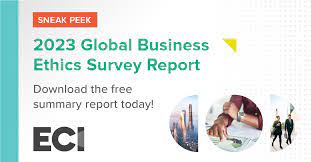ECI’s New Survey – The State of Ethics & Compliance in the Workplace

Daniela Melendez, a new Associate at The Volkov Law Group, joins us for her first blog posting. If you want to contact Daneila, she can be reached at [email protected].
The Ethics and Compliance Initiative (“ECI”) is a terrific organization that provides important ethics and compliance insights and leadership. Starting in 1994, ECI has conducted a longitudinal, cross-section study of workplace conduct. ECI recently issued its 5 trends of the 2023 Global Business Ethics Survey (“GBES”), which provide important benchmarks on the state of ethics and compliance programs.
ECI focuses on the connection between an organization’s ethical culture and workplace behaviors. This connection is the critical foundation to ethics and compliance work. ECI typically connects corporate culture to employee performance.A positive corporate culture translates into commitment, modeling and low rates of employee misconduct.
ECI uses four key measures that directly impact ethical outcomes – (1) pressure in the workplace to compromise ethical standards; (2) observations of misconduct; (3) reporting misconduct; and (4) retaliation experienced by employees after they reported misconduct.

The 2023 GBES identified five trends in the Ethics & Compliance teams around the world.
First, employees are facing pressure to commit to ethical workplace standards.
Second, more than 50% of the employees around the globe are witnesses of misconduct in their workplace.
Third, whistleblowers are still facing retaliation. It is important for companies to reduce the retaliation rate because employees that feel more comfortable to report misconduct give the company more visibility regarding potential wrongdoing.
Fourth, the GBES also identified that even though whistleblowers in some cases face retaliation, most employees report wrongdoing. Thus, companies should continue to strive to increase employee reporting rates. Companies that have a higher rate of reporting have less risk of harm or reputational damage.
Finally, the survey noted that employees reported it was rare to observe ethical conduct by senior management, supervisors and coworkers.

In sum, while employees face pressure to compromise their ethical standards, employees recognize that they must follow their own personal ethical guidelines to avoid engaging in misconduct. Employees are still reporting misconduct even though they fear retaliation.
If companies invest more resources in building an ethical culture in their workplace, rates of misconduct and hopefully retaliation will decrease. Thus, ECI’s survey confirms that micro-focused incentives and decisions will positively impact the company’s culture and prevent potential wrongdoing.














